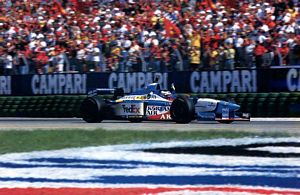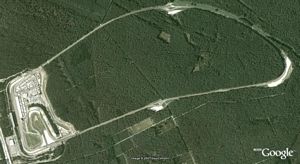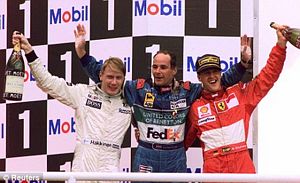|
By accessing or using The Crittenden Automotive Library™/CarsAndRacingStuff.com, you signify your agreement with the Terms of Use on our Legal Information page. Our Privacy Policy is also available there. |

Hockenheim revisited - 1997 - Berger's last win
|
|---|
|
|
Hockenheim revisited - 1997 - Berger's last win
Matt Hubbard
Speedmonkey
July 19, 2012
A gelding is a male horse that has been castrated - thereby removing the testosterone production and calming the beast. The Hockenheim of 2012 is a gelding of a race track compared to the stallion that existed from 1965 until 2001 when Hermann Tilke was instructed to redesign it's super-fast layout. He simply took out the fast, exciting parts of the track and added in a straight and a couple of tight corners.
Mark Webber told reporters today (19 July 2012) that he thought, "The old Hockenheim was a really cracking circuit. It was a flat out blast through the forest and every time I brake at turn 2 on the new track I wish we continued in a straight line, on the route of the old circuit."
The Hockenheimring was built in 1932 using forest roads. It's original use was as a motorcycle race track and test track for Mercedes-Benz and Auto Union. In 1965 the Hockenheimring, or Hockenheim as we know it, was created. The original northern loop was retained and the stadium section, that survives to this day, was added to create a purpose built race circuit.
The 1965 layout was a very a fast circuit and in 1968 Jim Clark was killed in a Formula 2 race. Thereafter two chicanes were added and the track was lined with Armco. And so was created the Hockenheim Formula 1 track that many of us know and love.
In 1997 Gerhard Berger started his thirteenth year in Formula 1. He was 37 and, over his career, had won nine races and raced for ATS, Arrows, Benetton, Ferrari, McLaren, Ferrari (again) and, finally, Benetton again.
He had not won a race since 1994 - at Hockenheim in a Ferrari.
Berger had suffered a lacklustre start to the 1997 season but in the third race at Brazil he finished second. After that his season went downhill again and in Spain he finished tenth. Thereafter he missed three races following a sinus operation and on the eve of his race return at Hockenheim his father was killed in a light aeroplane crash.
Bennetton had offered to let Gerhard miss the German Grand Prix but he declined their offer and turned up to race.
On the Saturday Berger qualified on pole with Fisichella in the Jordan in second, Hakkinen in the McLaren third and Schumacher in the Ferrari fourth, Frentzen in the Williams was sixth and Berger's team mate, Jean Alesi was sixth. Man of the moment, Jacques Villeneuve, qualified down in ninth in the Williams.
On race day Villeneuve set the fastest lap in morning practice.
At the start the first three drivers made good starts but behind them Villeneuve had to take avoiding action following an incident between Frentzen and Irvine at the first corner. Coulthard was hit by Frenzten and went off. Subsequently Coulthard, Frentzen and Irvine retired.
Berger started to build a lead with Fisichella and Schumacher battling behind. He was on a two stop strategy whilst the two behind him were scheduled to stop once. As such he had to build a gap to second place. This he did metronomically with a set of fastest laps. On lap 17 he pulled into the pits with a 12.3 second lead.
After Schumacher and Fisichella's stops Berger was back in the lead again. It was lap 24. He had another stop to make but the others were able to race until the end. A pit stop took 30 seconds and on lap 28 he was 19 seconds in front of Fisichella. Berger was scheduled for another stop on lap 34 so had to increase his lead by another 11 seconds in six laps.
Sitting at home watching the race on television this was turning into high drama. We all knew of Berger's journey to the race. The twilight of his career, the poor start to the season, the illness and finally his fathers death. In a season otherwise dominated by the Williams this was high drama. And Berger was a massively popular character in the pit lane and amongst the fans. We were all cheering him on.
A lap of the Hockenheim circuit was thus - start in the stadium section surrounded by grandstands full of thousands of German fans. Turn one, Nord Kurve, is a right hander and then an almost mile long straight to the Clark chicane. Another long straight to the Ost chicane, yet another nearly mile long straight to the Senna chicane, a final mile long straight then a ninety degree right into the stadium section which is essentially a left hand u-turn, a right hand u-turn and then onto the start/finish straight again.
Therefore the cars were set up for straight line speed (220mph was achievable) and the track rewarded a heavy right foot and a heavy, but skilfully applied, touch on the left foot to brake into the chicanes, a dash of balance on the wheel through stadium and, above all, a healthy dose of bravery.
Back to the race. Berger was ahead of Fisichella but need to increase his lead by 11seconds in six laps in order to pit and come out ahead of the Jordan. He had six laps in which to achieve this. And it wasn't working. Berger was a mere 1 second per lap faster than Fisichella. To make matters worse Jan Magnussen's Ford engine in his Stewart blew up and Berger lost even more time driving through the cloud.
Berger pitted on lap 34 and came out just behind Fisichella. He was was second and we were gutted.
Then Fisichella went wide and Gerhard nipped through on the inside. He was back in the lead. We all cheered.
Berger then drove to his, and Benetton's final win. Fisichella's tyre punctured on lap 39 and he finished eleventh. Schumacher came in second and Hakkinen third.
After the race Gerhard announced he was retiring at the end of the season. His season continued as it had before the race with a high point of fourth place both at the Nurburgring and at Jerez - his last F1 race.
Gerhard Berger was one of the great Formula 1 drivers. Never a champion but highly valued by the top teams and by the others drivers. He was Senna's best friend and team mate for three years. For the fans his win at the 1997 German Grand Prix was a magical and never to be forgotten moment in F1 history.

















 Topics: German Grand Prix, Gerhard Berger
Topics: German Grand Prix, Gerhard Berger



